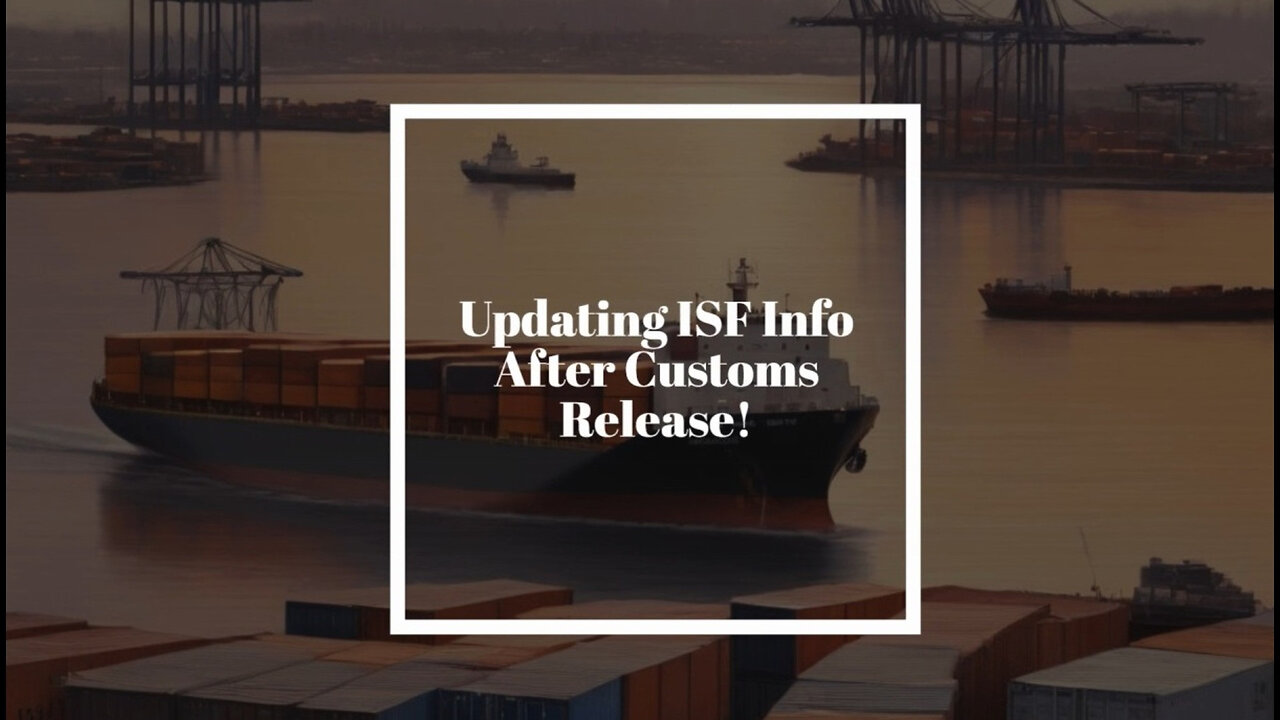Premium Only Content

ISF Updates: What Happens After Customs Release but Before Cargo Leaves the US
ISF Cargo | Phone: 786-865-0459
Email: isf@isfcargo.com | https://isfcargo.com
Welcome back to our channel! Today, we will be exploring the topic of updating Importer Security Filing (ISF) information after cargo has been released from customs but has not yet left the US. The ISF filing is a crucial part of the customs process for importers bringing goods into the United States. It requires specific information to be submitted prior to the arrival of the cargo, allowing US Customs and Border Protection (CBP) to assess the risk and identify any security concerns. However, there are instances where the ISF information may need to be updated after customs clearance.
When the ISF information needs to be updated post-clearance, importers or their customs brokers must take immediate action. The updated information should be filed electronically with CBP through the Automated Broker Interface (ABI) system. Depending on the updates required, the existing ISF filing may need to be updated or a new one created.
It's important to note that any changes or updates to the ISF information may trigger additional examinations or inspections by CBP. These are conducted to ensure the accuracy and legitimacy of the updated information and the contents of the cargo. Importers and customs brokers should be prepared for potential additional costs or delays resulting from these examinations or inspections.
Several situations may necessitate ISF information updates after customs release but before the cargo leaves the US. For example, changes in the voyage or carrier information, such as a last-minute vessel change or a change in the scheduled departure date, require the ISF information to be updated accordingly. Changes in the packaging, quantity, or weight of the cargo also warrant updates to the ISF filing.
It is crucial to understand that failing to update the ISF information when necessary can have serious consequences. CBP has the authority to enforce penalties if inaccurate or incomplete information is discovered. These penalties can include monetary fines, cargo holds, or even refused entry into the country. Therefore, importers and customs brokers must ensure that the ISF information is always accurate and up to date to avoid such penalties.
Lastly, maintaining continuous communication between importers, customs brokers, and other relevant parties is essential in avoiding complications and ensuring prompt updates when necessary. Staying proactive and keeping all parties informed about any changes or updates can help prevent potential issues and ensure a smooth customs process.
Thank you for watching today's video! We hope this information has provided valuable insights into the importance of updating ISF information after customs release but before the cargo leaves the US. Don't forget to subscribe to our channel and hit the notification bell for more informative videos. See you next time!
#usimportbond #isfcustomsbroker #uscustomsclearing #isfentry
Video Disclaimer Here: This content is for educational use and not associated with any US government body.
00:34 - ISF (Importer Security Filing) is a crucial process for importing goods into the US, requiring specific information to be submitted before arrival.
01:22 - Updates to ISF information after customs clearance but before cargo leaves the US must be done immediately through the ABI system.
02:44 - Failure to update ISF information when necessary can result in penalties, including fines, cargo holds, or refused entry.
03:13 - Continuous communication between importers, customs brokers, and involved parties is key to ensuring accurate and up-to-date ISF information.
-
 2:34:02
2:34:02
Barry Cunningham
6 hours agoLISA COOK | ADAM SCHIFF | LETITIA JAMES | ARE THEY BEING SACRIFICED BY THE DEEP STATE?
79.6K52 -
 1:36:19
1:36:19
Flyover Conservatives
14 hours agoOnly 17% of Millennials Hit These 5 Adult Milestones—Why?; What If Childhood Trauma Is Behind Your Health Problems? - Dr. Troy Spurrill | FOC Show
26.5K3 -
 4:49:04
4:49:04
HogansAlleyHero
16 hours ago💥CHASING DOPAMINE💥✅TRUMP SAYS BATTLEFIELD IS THE BEST✅
33.9K2 -
 1:57:40
1:57:40
MattMorseTV
6 hours ago $10.57 earned🔴Trump just SHATTERED the PROJECTIONS.🔴
48.9K46 -
 2:32:19
2:32:19
megimu32
5 hours agoOTS: From Star Search to Superstardom
34.9K4 -
 1:56:21
1:56:21
Joker Effect
4 hours agoInterviewing GREENMAN! Looks like he is coming to Rumble! Let's give him a warm welcome! REAL TALENT
21K1 -
 1:07:21
1:07:21
Anthony Rogers
11 hours agoEpisode 380 - Is Pain All In Your Head?
14.6K3 -
 1:46:17
1:46:17
Glenn Greenwald
9 hours agoGlenn Takes Your Questions on Censorship, Epstein, and More; DNC Rejects Embargo of Weapons to Israel with Journalist Dave Weigel | SYSTEM UPDATE #505
115K8 -
 3:26:34
3:26:34
Jokeuhl Gaming and Chat
10 hours agoHelldivers 2 - Spreading Democracy w/ Ryker
12.2K1 -
 27:47
27:47
Stephen Gardner
5 hours ago🚨BREAKING: Trump FURIOUS Over Kamala’s Latest Move – SHOCKING Details!
17.4K79